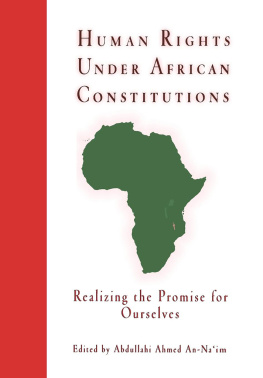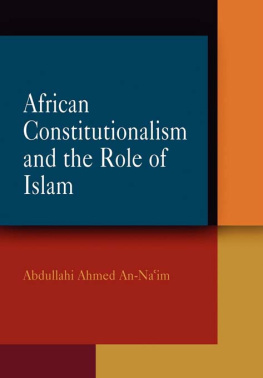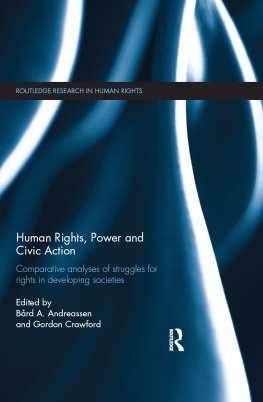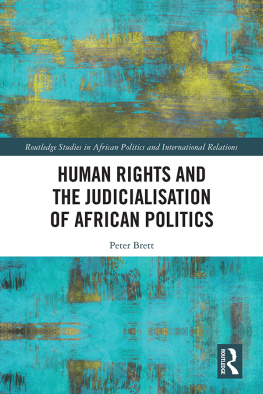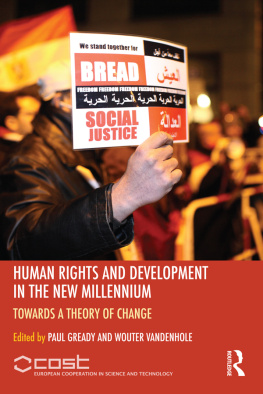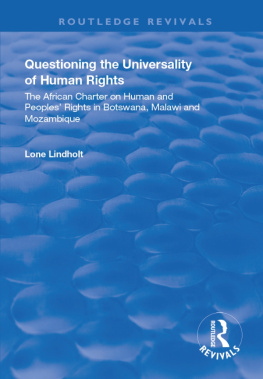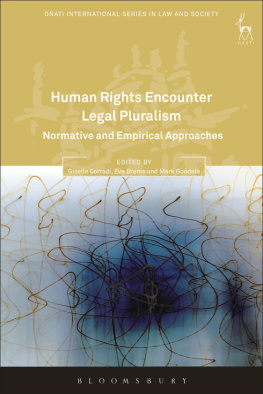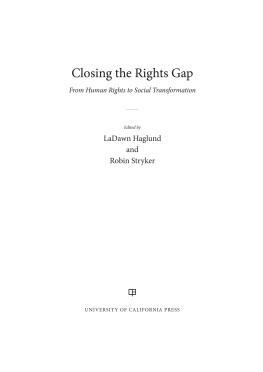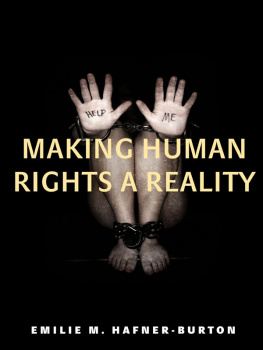Copyright 2003 University of Pennsylvania Press
All rights reserved
Printed in the United States of America on acid-free paper
10 9 8 7 6 5 4 3 2 1
Published by
University of Pennsylvania Press
Philadelphia, Pennsylvania 19104-4011
Library of Congress Cataloging-in-Publication Data
Human rights under African constitutions : realizing the promise for ourselves / edited
by Abdullahi Ahmed An-Naim.
p. cm. (Pennsylvania studies in human rights)
Includes bibliographical references and index.
ISBN 0-8122-3677-7 (cloth : alk. paper)
1. Human rightsAfrica. 2. Rule of lawAfrica. 3. AfricaPolitics and government.
I. Naim, Abd Allah Ahmad, 1946- II. Series.
JC599.A36 H88 2003
323'.096dc21 2002074030
Contents
1.Introduction: Expanding Legal Protection of Human Rights in African Contexts
Abdullah! Ahmed An-Naim
2.Ethiopia: Processes of Democratization and Development
Meaza Ashenafi
3.Ghana: Competing Visions of Liberal Democracy and Socialism
Nana K. A. Busia, Jr.
4.Guinea: Building the Rule of Law for Social Development
Ibrahima Kane
5.Morocco: The Imperative of Democratic Transition
Abdelaziz Nouaydi
6.Mozambique: Nurturing Justice from Liberation Zones to a Stable Democratic State
Luis Mondlane
7.Nigeria: Combating Legacies of Colonialism and Militarism
Chinonye Obiagwu and Chidi Anselm Odinkalu
8.Rwanda: Building Constitutional Order in the Aftermath of Genocide
Bibiane Mbaye Gahamanyi
9.South Africa: The Interdependence of All Human Rights
Lucrecia Seafield
10.Sudan: In the Shadows of Civil War and Politicization of Islam
Siddig A. Hussein
11.Uganda: The Long and Uncertain Road to Democracy
Livingstone Sewanyana and Taaka Awori
Preface
All the country studies in this book were prepared for a major project on the legal protection of human rights in African countries co-organized by the International Centre for the Legal Protection of Human Rights (In-terights), based in London, and the Inter-African Network for Human Rights and Development (Afronet), based in Lusaka, Zambia. The project was generously supported by grants from the British Council, the Ford Foundation, GTZ (Germany), Norwegian Church Aid, and the Swedish NGO Foundation for Human Rights.
As emphasized at all stages of the project, the mechanisms and processes of legal protection of human rights should be neither pursued in isolation from the social, economic, and political context of African societies, nor assumed to be sufficient by themselves for the effective implementation of human rights standards. By focusing on the legal protection of human rights in specific countries, the project sought to take a realistic yet visionary view of the practical possibilities and limitations of these mechanisms and institutions as part of a broader range of strategies for the implementation of human rights in African societies. A planning meeting, held in Lusaka, Zambia, in July 1995, sought to clarify the conception and rationale of the project and identified a representative sample of countries in terms of geopolitical location, legal culture and system, regime of government, and role of the state and of customary or religious law. The countries selected at that meeting were Botswana, Egypt, Ethiopia, Ghana, Guinea, Kenya, Morocco, Mozambique, Nigeria, Rwanda, Senegal, South Africa, Sudan, Uganda, Zaire (as it was known then), and Zambia. Draft studies of the selected countries were presented and discussed at a conference in Dakar, Senegal, in December 1997, in collaboration with Rencontre Africaine pour la Dfense des Droits de lHomme (RADDHO). Unfortunately, it has not been possible to include all those country studies in this volume.
The challenge is to utilize the conceptual and practical similarities of the struggles of African peoples for individual freedom and social justice in addressing specific country situations through national as well as continental and global efforts. It is true that the situation in each country should be understood on its own terms, as a basis for detailed strategies of legal protection of human rights in the context of the normative framework and institutional arrangements prevailing in the particular country. But the rationale of the present project is that such country-specific initiatives should benefit from insights gained from the experiences of other countries, as well as an understanding of historical and current developments affecting all African societies, though not necessarily in the same manner or to the same degree. In the final analysis, striving for the legal protection of human rights should be based on a clear understanding of the nature of the constitutional and legal orders under which such protection is supposed to materialize. But this endeavor also calls for reflection on the relevance and efficacy of human rights as setting the normative standards of protection.
The proposed approach balances the multifaceted diversity of Africa against the similarity of the experiences of its peoples with colonialism and its aftermath. On the one hand, one needs to be careful about generalizations in view of the diversity of cultural, ethnic, religious, and other features of African societies. On the other hand, the similarities of recent African experiences are too obvious and relevant to ignore in efforts to pool resources and develop responses to the drastic consequences of past colonialism and current differentials in global power relations. For the purposes of the legal protection of human rights in particular, those consequences include the establishment of European model nation-states premised on specific constitutional and legal assumptions, and ways in which that model was misconceived or misapplied in African settings. They also encompass patterns of political development, educational systems, and social trends as well as economic, technological, and other forms of postcolonial dependencies of African countries on developed industrialized countries.
These phenomena should also be understood in the context of increasing globalization. This term is commonly used today to emphasize notions of interdependence, the role of new technologies, the integration of markets, the shrinking of time and space, particularly, the intensification of worldwide social relations, whereby local events are shaped by apparently distant factors and actors. But one should also note that globalization raises possibilities of coercion, conflict, polarization, domination, inequality, exploitation and injustice, monopolies, disruptions and dislocations of the labor and other markets, the emergence of a global regulatory chaos that can be manipulated for economic or political gain. All these factors and actors should be taken into consideration in appreciating the contextual approach to the legal protection of human rights adopted in the following chapters.
Without claiming to do so definitively or exhaustively for any particular country, this project attempts to provide a coherent approach to understanding and documenting the relation between civil society and the state in Africa. Second, the project seeks to develop strategies for overcoming the sense of apathy and powerlessness among the population at large toward the state and its institutions, including its constitutional and legal order. The underlying rationale of this approach is that, despite its earlier noted limitations, the legal protection of human rights is both an end and part of the means for addressing the situation in African countries. But it is important to acknowledge first the reality and negative consequences of the present relation between civil society and the state, and its implications to the principle of constitutionalism and the repeated failure of African constitutions. Otherwise, it would be merely wishful thinking, if not harmful, to speak of the legal protection of human rights under African constitutions.

